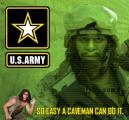Deploying additional forces could backfire, however, if the United States and its allies don't devise a coherent strategy to defeat the Taliban insurgency, strengthen the Afghan government, bolster the country's economy and deprive Islamic militants of their safe haven in neighboring Pakistan.
The calls for reinforcing the U.S.-led military coalition come amid the worst violence since the 2001 U.S. invasion of Afghanistan, with the 7-year-old ''forgotten war'' in May and June claiming more U.S. dead than Iraq for the first time.
More foreign troops, however, would do little more than turn more war-weary Afghans against U.S.-backed President Hamid Karzai if they are not part of a broader and more effective counterinsurgency strategy, some experts and U.S. officials warned.
"There is not one strategy with one person in charge,'' said a U.S. defense official, who requested anonymity because he wasn't authorized to speak publicly. "If we had asked the Taliban to draw an organizational chart for allied forces in Afghanistan, they would have drawn this one."
As a result, U.S. and NATO troop have had to cede areas to the insurgents or turn over newly reclaimed territory to poorly trained, ill-equipped and illiterate police who often flee when attacked, are in cahoots with the militants or abuse the local population.
''You win every battle but lose the war because you can't hold any ground,'' said John McCreary, a former senior intelligence analyst for the Joint Chiefs of Staff.
The U.S.-led coalition is also desperately short of soldiers who can mentor Afghan National Police units. An estimated 3,500 more advisors are needed to live and work with newly trained police units.
Another looming requirement is for more experienced U.S. combat troops to deal with what U.S. commanders think may be an influx of foreign militants who might have otherwise gone to Iraq.













Bookmarks